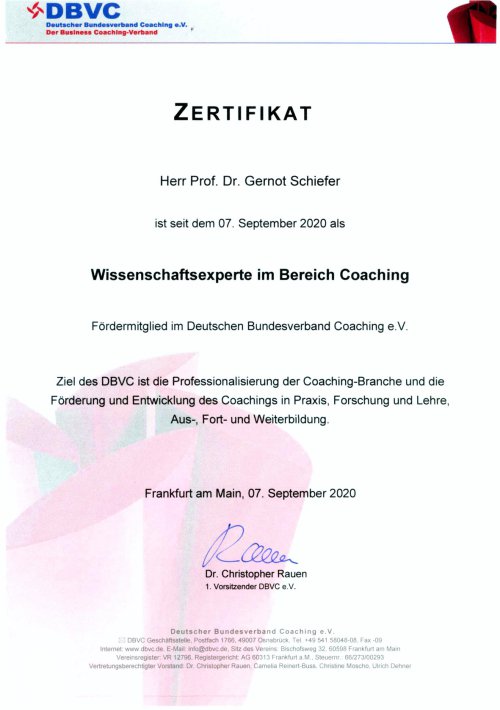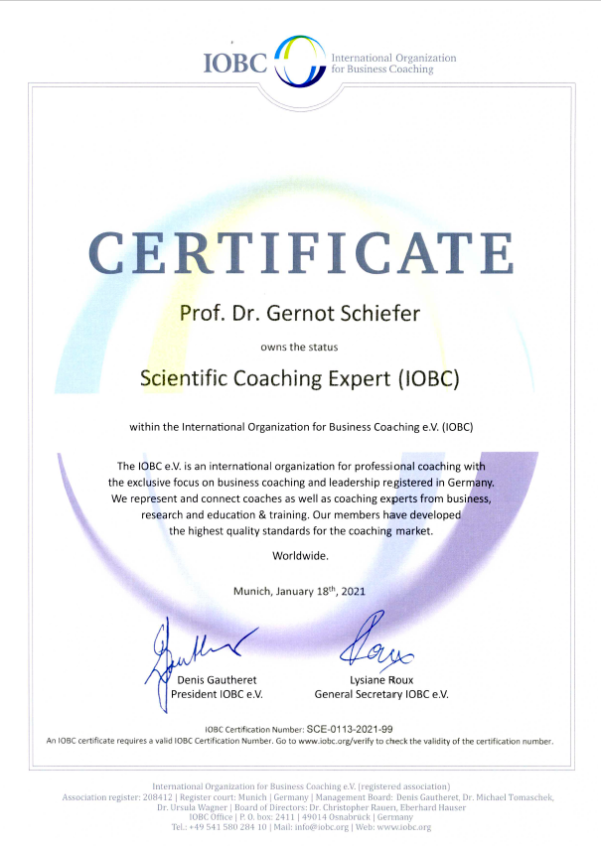Coaching
 Over the course of our lives we experience various styles of authority. During childhood we learn at an early stage that mother, father and teacher assert their authority in different ways. We have analogous experiences as adults in our working life. The old but still practised style of management bestows authority by virtue of the contract of employment. The subordinate person has to obey the authority of his superior “without answering back”. The absoluteness of this style of authority does however also have exonerative aspects: the employee does not have to make any decisions himself and is liberated from the pressure of responsibility.
Over the course of our lives we experience various styles of authority. During childhood we learn at an early stage that mother, father and teacher assert their authority in different ways. We have analogous experiences as adults in our working life. The old but still practised style of management bestows authority by virtue of the contract of employment. The subordinate person has to obey the authority of his superior “without answering back”. The absoluteness of this style of authority does however also have exonerative aspects: the employee does not have to make any decisions himself and is liberated from the pressure of responsibility.
Managers today are increasingly required to adopt a style of authority that would be expected of a good colleague. They are expected to integrate members of staff into the work process and the decisions that are needed for this. It is no longer a question of dictating assignments and rewarding their blind instruction but rather one of bringing to light employees’ expertise and motivating them to apply their abilities to the company’s success. The individual employee is given greater decision-making authority and responsibility. In this way the manager can achieve a kind of authority that is granted to him not just “from above” but is entrusted in him by staff on the basis of his cooperative and motivating style of working.
Many people who have grown up under a “top-down” style of authority do not find it easy to practise a cooperative style of management. For the style of authority experienced during childhood and adolescence usually leaves lasting impressions in the unconscious which often stand in the way of cooperative management styles and the ability to work as part of a team. Many people find these new requirements for delegating tasks on the one hand and extending their fields of responsibility on the other to be a burden on the psyche.
Coaching provides an intensive and effective solution to the balancing act of reconciling the various expectations of the professional environment with styles of authority. It identifies ways of discovering one’s unconscious structures of expectation and leadership, reflecting on them and then taking them into consideration appropriately when making decisions in the future.
With my psychoanalytical coaching concept I pursue the objective of professionalizing the manager, which explicitly includes taking the development of the personality into account. In my coaching the individual thus takes centre stage with his unconscious motives, resources and competence profile.
I focus on the following levels:
- personal competence
- interpersonal competence
- team competence
- organizational competence
Depending on the intensity of the consultation I distinguish between the long-term accompaniment of managers and focused crisis intervention.
-
Long-term accompaniment of managers
This form of coaching takes into consideration the whole personality of the manager together with his previous professional history. It tackles the issue of difficulties that arise recurrently, even in different employment relationships: e.g. problems dealing with authority and one’s own staff or problems finding a position in the company where one enjoys recognition, or indecision in planning one’s career.Long-term accompaniment also focuses on structures of decision-making and action for which no conscious motives can be accounted for and which the individual deliberately can no longer access. Uncovering unconscious motives will bring to light new resources and help to break down barriers with other members of staff. The objective here is the long-term psychic stabilization of the client in both his professional and his personal environment.
-
Focused conflict management and crisis intervention
This form of coaching deals with crises which develop suddenly and which may be attributed to one or a few clearly definable causes. Such coaching can for example help people who are under great pressure to succeed or are suffering under company restructuring. They must take on additional work from their colleagues who have been laid off, or cannot come to terms in their new department. If this leads to the employee’s capacities being overloaded this can result in psychosomatic illnesses. Tinnitus (buzzing in the ears) is a classic example of such stress-related illness.
I am active as a Scientific Expert in the most important and renowned coaching umbrella organization DBVC Deutscher Bundesverband Coaching e.V. and additionally as a Scientific Coaching Expert member of the IOBC International Organization for Business Coaching e.V., the international umbrella organization for professional business coaching and leadership.
If you are not sure whether psychoanalytically-oriented coaching can assist you in your work, I would be only too pleased to help you in a preliminary discussion.
go to top


